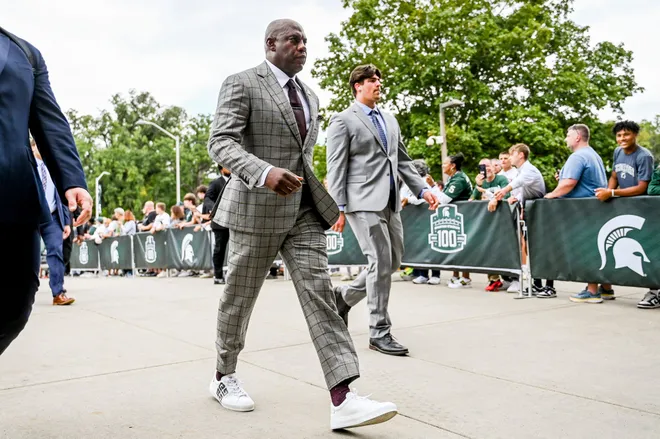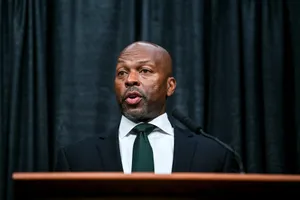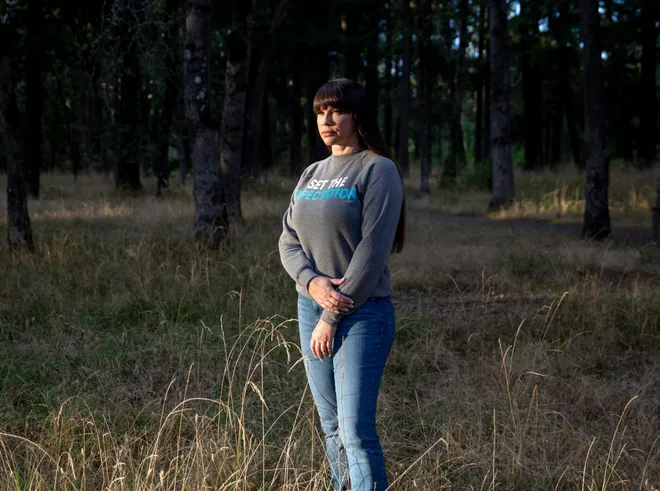Michigan State investigation finds Mel Tucker sexually harassed rape survivor

Former Michigan State University football coach Mel Tucker has been found responsible for violating the school's sexual harassment policy – a huge victory for the woman who accused him, prominent rape survivor and activist Brenda Tracy, and a permanent stain on the reputation of one of the nation’s highest-paid coaches.
In a 73-page report issued Wednesday afternoon, a university hearing officer determined Tucker sexually harassed and exploited Tracy when he masturbated and made sexual comments without her consent during an April 2022 phone call, eight months after he hired her as a sexual violence prevention educator.
The officer also found Tucker made unwanted sexual advances toward Tracy in the months before the call and engaged in quid pro quo sexual harassment after, when he subsequently ended their business relationship.
Tucker's account to the investigator – that he and Tracy had been in a romantic relationship and had consensual "phone sex" – was deemed less plausible, less consistent and less supported by the evidence than Tracy's, according to the report, which Tracy shared with USA TODAY.
The report concludes: "In sum, considering all available evidence, the Resolution Officer finds, by a preponderance of the evidence, that there is sufficient evidence to conclude that Respondent subjected Claimant to unwelcome conduct based on sex when he FaceTime video called Claimant without a shirt on; when he attempted to meet up with Claimant alone following the Spring Game; and when he non-consensually masturbated and used graphic, sexual language on a phone call with Claimant."
USA TODAY's investigationMichigan State football coach Mel Tucker accused of sexually harassing rape survivor
The finding of fault against Tucker comes 10 months after Tracy filed a complaint with the university's Title IX office. An outside attorney hired by Michigan State spent seven months investigating, and the school held a formal hearing in the case on Oct. 5 via Zoom, which Tucker did not attend.
"My first reaction was tears of relief," Tracy said Wednesday, adding that the reporting process has "been a nightmare to navigate."
A phone call and message to Tucker's cellphone went unreturned. In a statement Thursday morning through his agent, Neil Cornrich, Tucker said the decision is "fraught with countless factual and legal errors" and he will appeal and file a lawsuit if necessary.
Michigan State suspended Tucker on Sept. 10, hours after Tracy went public with her allegations in a USA TODAY investigation, and fired him for cause two weeks later. Even accepting Tucker’s defense as accurate would still constitute a fireable offense, athletic director Alan Haller wrote in the termination letter.
While criminal investigations can lead to arrests and convictions, campus sexual harassment proceedings can lead to a range of disciplinary actions by the university, up to and including termination of employees. For those like Tucker, who have been found at fault but are no longer employed, sanctions can include campus bans and restrictions on access to school activities, as well as restitution for victims.

The hearing officer, Virginia-based Title IX attorney Amanda Norris Ames, wrote that Tucker's repeated contradictory statements to the investigator made his account difficult to believe. Tucker also did not present any documentation or witnesses supporting his claims that he and Tracy had been romantically involved, while several witnesses, text messages and emails supported Tracy's version of events, Ames found.
A key claim that damaged Tucker's credibility, Ames wrote, were his false statements to the investigator that he had been either at home in Michigan or on a non-university-sponsored trip when the now-infamous phone call occurred. Records obtained by the investigator showed Tucker had, in fact, been in Florida, attending a charity golf tournament on the university's dime. An expense report he submitted to Michigan State seeking reimbursement for his hotel and meals showed the trip's purpose was administrative and did not involve personal travel.
While he was there, he toured a tomato farm to promote a university program to help farmworkers earn degrees, according to an itinerary on Michigan State letterhead obtained by USA TODAY through a public records request.
Ames also highlighted that, despite his claim of a consensual romantic affair, Tracy and Tucker did not communicate for three months after the April 2022 call, during which Tucker did not respond to Tracy's messages. Tucker's claim to the investigator that he was too "busy" to respond to Tracy was not credible, Ames found, given the frequency with which he had communicated with Tracy throughout the previous football season.
Tucker also gave conflicting reasons for canceling Tracy's third planned visit to campus, which had been scheduled for July 2022, three months after the phone call. Tucker blamed a scheduling conflict, telling the investigator he had yielded the time to his new mental conditioning coach, who needed to implement a new program on short notice. But records showed that the coach had already been meeting with the team for weeks and did not hold any meetings the week Tracy was supposed to be in town.
Ames found sufficient evidence to conclude that Tucker subjected Tracy to unwanted advances on two occasions before the masturbation incident: when he called her shirtless via FaceTime in November 2021, and when he repeatedly called Tracy asking her to meet him alone in a discreet location after the Spartans' April 2022 spring football game.
Tracy expressed to Tucker on at least three occasions that they needed to keep their relationship professional, Ames wrote. She feared that upsetting him would jeopardize her business relationship with the university and that she had to manage his "feelings and ego" to maintain it.
By ending their business relationship after Tracy had rejected his sexual advances, including his masturbation, Tucker engaged in "quid pro quo" sexual harassment, Ames found – conditioning employment benefits on her submission to his conduct. Ames also found Tucker's actions were severe, persistent and pervasive enough to create a hostile environment for Tracy by "unreasonably interfering with her work and her ability to provide services as a vendor" to Michigan State athletics.
Tucker has 10 business days to file an appeal. He can argue that the outcome was unjust, that the school didn't follow its policies, or that the investigator or hearing officer is biased. He can also try to admit new evidence if it was unavailable to the hearing officer before the hearing and if it could have affected the outcome.
If the school denies the appeal, however, today’s decision is final.
In an Oct. 5 letter to MSU's Board of Trustees, Tucker's attorney claimed to have found new evidence proving Tracy falsely accused him: a new witness statement and a trove of Tracy’s private text messages from the cellphone of Tracy’s longtime friend and assistant, Ahlan Alvarado, who died in a car accident in June. In his statement Thursday, Tucker indicated he will try to get them admitted as evidence in his appeal.

The text messages revealed that Tracy had a prior relationship with a basketball coach unaffiliated with Michigan State, had been struggling financially at the time she filed her complaint and that she had discussed the possibility of settling her claims against Tucker or the school in exchange for money.
Legal experts told USA TODAY the texts loosely relate to her allegations and may hold little evidentiary weight.
After Tucker's attorney and agent sent the messages to the media, an Ingham County, Michigan, judge granted Tracy an emergency restraining order barring them from releasing more from the cellphone, which Tracy said contained her business records and other confidential information. A different judge, Wanda Stokes, will determine if that restraining order should stick at a hearing in Ingham County Circuit Court on Thursday.
The individual whom Tucker’s legal team claims has new information about the case was revealed in court documents last week to be Alvarado's cousin, Jennifer Ruiz. She claimed in a sworn affidavit that Alvarado had told her Tracy and Tucker had been in a relationship and that the phone call was consensual – contradicting Alvarado's account to the investigator.
Ruiz, however, has never spoken to the university's investigator or opened herself to questioning to determine if her account is credible. Until she does, her account holds no evidentiary value, Title IX attorney Patrick Mathis told USA TODAY.
Ruiz did not respond to a phone call or text message from USA TODAY seeking comment.
Tucker has indicated he plans to sue the school for wrongful termination and to recoup at least some of the roughly $80 million remaining on the 10-year, $95 million contract extension he signed in November 2021.
Kenny Jacoby is an investigative reporter for USA TODAY covering sexual harassment and violence and Title IX. Contact him by email at kjacoby@usatoday.com or follow him on X @kennyjacoby.

Disclaimer: The copyright of this article belongs to the original author. Reposting this article is solely for the purpose of information dissemination and does not constitute any investment advice. If there is any infringement, please contact us immediately. We will make corrections or deletions as necessary. Thank you.







